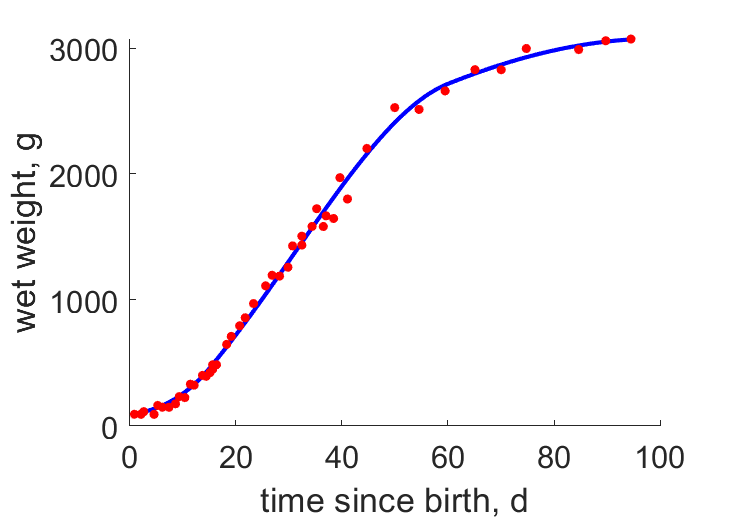Predictions & Data for this entry
| Model: std | climate: MB, MC | migrate: Ms | phylum: |
| COMPLETE = 2.5 | ecozone: MPW | food: biCvf | class: |
| MRE = 0.013 | habitat: 0iMc | gender: Dg | order: |
| SMSE = 0.001 | embryo: Tncfm | reprod: O | family: |
Zero-variate data
| Data | Observed | Predicted | (RE) | Unit | Description | Reference |
|---|---|---|---|---|---|---|
| ab | 44 | 44.84 | (0.01899) | d | age at birth | Wing1984 |
| tx | 108 | 108 | (2.489e-05) | d | time since birth at fledging | Wing1984 |
| tp | 324 | 322.4 | (0.004933) | d | time since birth at puberty | guess |
| tR | 730 | 730 | ( 0) | d | time since birth at 1st brood | AnAge |
| am | 1.204e+04 | 1.205e+04 | (0.0002801) | d | life span | AnAge |
| Wwb | 91 | 90.07 | (0.01026) | g | wet weight at birth | Wing1984 |
| Wwi | 3500 | 3535 | (0.009975) | g | ultimate wet weight | Wing1984 |
| Ri | 0.00274 | 0.002718 | (0.007946) | #/d | maximum reprod rate | AnAge |
Uni- and bivariate data
| Data | Figure | Independent variable | Dependent variable | (RE) | Reference |
|---|---|---|---|---|---|
| tW |  | time since birth | wet weight | (0.03675) | Wing1984 |
Pseudo-data at Tref = 20°C
| Data | Generalised animal | Morus serrator | Unit | Description |
|---|---|---|---|---|
| v | 0.02 | 0.02278 | cm/d | energy conductance |
| p_M | 18 | 618.5 | J/d.cm^3 | vol-spec som maint |
| k_J | 0.002 | 0.02549 | 1/d | maturity maint rate coefficient |
| k | 0.3 | 0.3016 | - | maintenance ratio |
| kap | 0.8 | 0.962 | - | allocation fraction to soma |
| kap_G | 0.8 | 0.8002 | - | growth efficiency |
| kap_R | 0.95 | 0.95 | - | reproduction efficiency |
Discussion
- Feeding is reduced towards end of nestling period
- Long tp cannot be captured by std model
- mod_1: v is reduced
- mod_2: Pseudo-data point k is used, rather than k_J; Data set tp and parameter t_R are added, the latter replacing clutch interval t_N. Postnatal T is based on PrinPres1991, see get_T_Aves. See further the revision page, theme puberty
Acknowledgment
- The creation of this entry was supported by the Norwegian Science Council (NFR 255295)
Bibliography